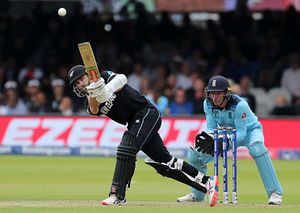In the end, an obscure legal technicality denied New Zealand their first ever Cricket World Cup. England was crowned the 2019 World Champions after a match that has been called the greatest in the modern history of the sport. After the Super Over, which itself is a tie breaker, ended in a tie, England won the trophy, based on the number of boundaries scored — a rule that both captains admitted they were unaware of before being informed by the field umpires in the final moments of the game.
Moments of confusion followed, with suggestions that the umpires had misinterpreted the rules for an earlier incident that was crucial in deciding the final outcome, and that it was perhaps better to have shared the trophy in this unprecedented situation. New Zealand Prime Minister Jacinda Ardern joked about “being traumatized “by the game, while lame-duck British Prime Minister Theresa May welcomed the winning English team to Downing Street.
In the middle of the turmoil, the Blackcaps conducted themselves with impressive poise and dignity, with their captain remarking that perhaps it “just was not meant to be.”
The Blackcaps, as the New Zealand national cricket team is called, have evoked strong affection from rival and opposing supporters alike for their spirited and serene approach to the game. Led by Kane Williamson, whose quiet, dignified leadership and resilient, elegant strokeplay were a huge factor in their success, the Kiwis defeated pre-tournament favorites India in the semifinal, in a game filled with dramatic twists and turns. Williamson later received the Player of the Tournament award from his childhood cricketing hero, Indian legend Sachin Tendulkar.
Martin Guptill’s run out of India’s 2011 World Cup winning captain, Mahendra Singh Dhoni, in the final stages of the semifinal game has already been described as a moment that has now been enshrined in New Zealand “sporting folklore.”
After that victory, and four years after losing to the Australians in the their first ever World Cup final in the last edition of the World Cup, which they co-hosted with Australia, New Zealand faced the hosts England in another final on Sunday.
This year’s journey into the final has fundamentally been a different campaign, and much less expected. The 2015 team was characterized by then-Captain Brendon McCullum’s aggressive, free approach to the game, in an era that redefined New Zealand cricket. McCullum has been cited as a personal influence by both Williamson and England captain Eoin Morgan. That team was also blessed by the presence and influence of Daniel Vettori, one of the greatest players ever produced by New Zealand, who retired immediately after the tournament. Vettori was one of only three players, along with World Cup winning former Indian captain Kapil Dev and England great Ian Botham, to have taken 300 wickets and 4,000 runs in test cricket. Then-head coach Mike Hesson, has also left, having been replaced by Gary Stead. Ahead of the final, which was held at one of cricket’s most storied venues, the Lords cricket ground, Stead opened up about cleaning windows at the same stadium nearly 30 years ago, while working as groundstaff.
This year’s team is much younger and defined by Williamson’s calmer, more modest approach to life and leadership, much in tune with the wider Kiwi way of life. Williamson, the finest batsman produced by New Zealand after the late great Martin Crowe, held together New Zealand’s batting in victories against South Africa and the West Indies, scoring gritty centuries in testing batting conditions. It is likely that Williamson will go down as the finest batsman his country has ever produced, if he sustains these standards and statistics for a few more years.
It is clear that New Zealand cricket is going through a golden period. The bowling unit led by Trent Boult and Lockie Ferguson, supported by Matt Henry and Tim Southee, is arguably the finest bowling attack with the new ball in world cricket today. They were instrumental in dismissing both the tournament’s leading run scorer, Rohit Sharma, and the world’s top ranked batsman, Indian captain Virat Kohli, for just a run each in the semis, moments that swung the match in New Zealand’s favor in the stroke of a few minutes. Yet New Zealand’s batting was overly dependent on Williamson and Ross Taylor, with both the openers and the middle order having been hopelessly out of form. This has been symbolized by opener Martin Guptill, who scored a swashbuckling double hundred against the West Indies four years ago, averaging less than 12 in his last eight innings.
Yet overall the identity of New Zealand cricket has been defined by quiet over-achievement. Even in the past, while perennially being labelled underdogs, they continued to produce world class players and reached the semifinals of the World Cup an impressive six times in 10 efforts prior to 2015.
New Zealand’s wait for the trophy will continue, but with their performance this Sunday in the game, and the instinctive grace they displayed in its aftermath, Williamson’s team may have achieved something that illustrious predecessors including Sir Richard Hadlee, Martin Crowe, Stephen Fleming, and Brendon Mcullum could not — to have forever removed the dark horse tag that has been the albatross around the neck of New Zealand cricket.
Kiran Mohandas Menon has written on international politics, law, and sport, with a focus on the Asia- Pacific and southern Europe, for various international publications, including The Diplomat. He is currently working at the International Nuremberg Principles Academy. The views expressed in this piece are his own.
































